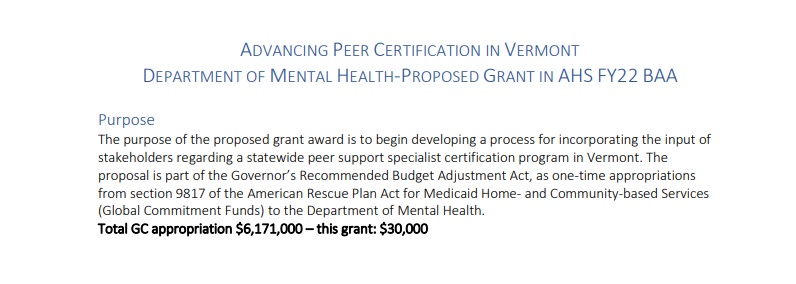After a bill that would have created a statewide certification program for peer support workers in Vermont failed in the legislature last spring, advocates continued to pursue the idea.
“When they kind of shut it down, the peer movement, in their own way, went back to the drawing board: OK, we’ve got to come at it a different way. Let’s try to redefine what we’re trying to say,” Vermont Psychiatric Survivors Executive Director Karim Chapman said.
Vermont is one of only four states that does not have a mental health peer certification process.
The Department of Mental Health issued a $30,000 grant to Pathways Vermont, which operates the state’s Peer Workforce Development Initiative, to pay for a series of meetings that would seek to resolve “key issues and risks” associated with peer certification by soliciting stakeholder input. Pathways subcontracted Wilda L. White Consulting, a firm owned and operated by the founder of the nonprofit MadFreedom.
Over the course of six Zoom sessions hosted by White this fall, peers and others discussed various potential forms of certification and certifying bodies, eligibility requirements and training focuses, as well as how the mental health continuum of care would incorporate certified peers. After each session, White distributed a survey to gather more detail from participants. DMH will review responses.
“Part of my job here is to submit a report,” White explained at the final meeting. “And in that report, it should contain a recommended design of a statewide peer support worker certification program, include a summary of items that need resolution, and then create a work plan of what are the next steps and how will we get that done.”
She explained that phase two of the process will be “convening a smaller group, still with broad stakeholder representation, to finalize where we go from here, so we can move into certification and move into implementation of a certification program.”
DMH intends to make use of this work, according to Director of Policy Nicole DiStasio.
“The Department expects to have a recommendation from the stakeholder workgroup that will inform the next steps for this critical work,” she said.
Last spring, after the legislature had stripped the funding from the peer certification bill drafted by Vermont’s peer-led organizations, those same organizations sent a letter to ask lawmakers to allow them to “work cooperatively with DMH to develop and implement a statewide peer certification program outside of the legislative process.”
But Vermont’s precise path to peer certification, if it happens, is not yet certain. Senator Ginny Lyons, the presumptive chair of the Senate Committee on Health and Welfare, mentioned her awareness of ongoing discussions involving the Office of Professional Regulation and the Secretary of State’s office as well as DMH and peers
“Do we need to do anything legislatively, except maybe rubber-stamp what’s happened or make some tweaks to what they’re proposing?” Lyons wondered. ““I will be catching up with that. I would like to bring them into committee and have that conversation.”

